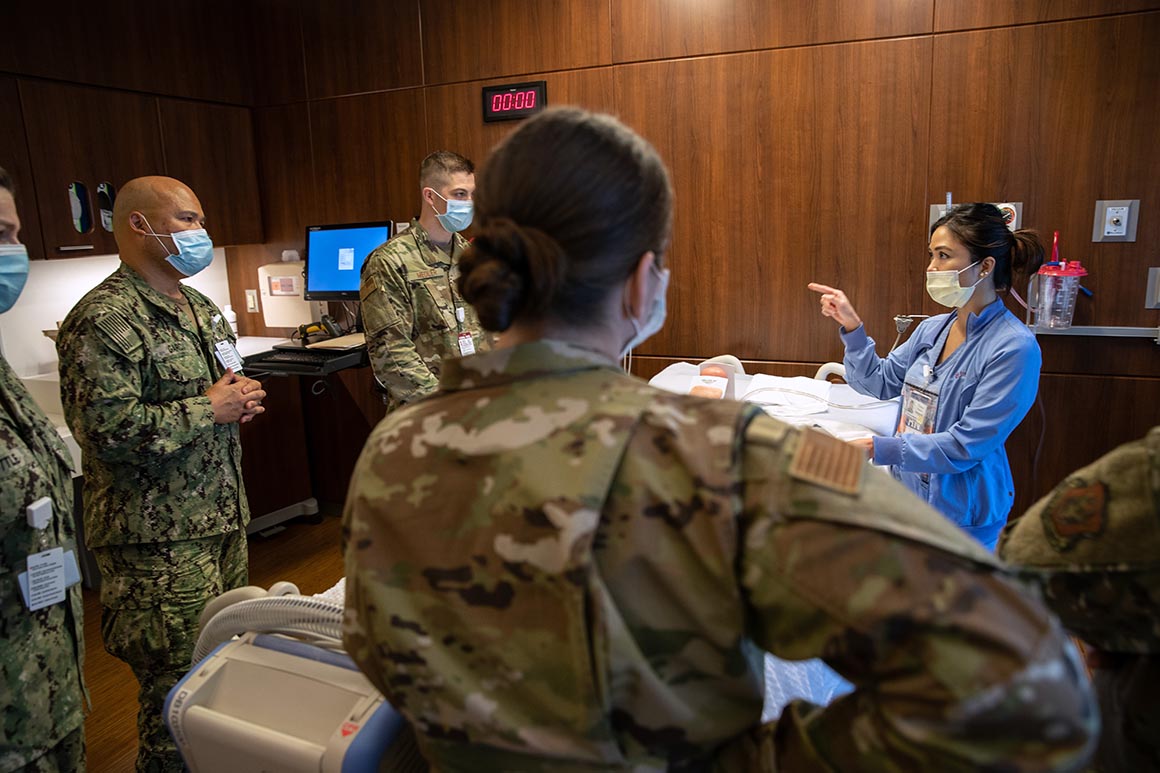
In Washington state, for example, Guard members comprise about a third of the state’s contact-tracing force, working to identify coronavirus outbreaks and locate people who have been exposed. More than 500 Guard members are currently performing such duties. According to the governor’s office, hundreds more are running community operations that have tested more than 1,600 people, assembled more than 28,000 testing kits and delivered nearly 14 million pounds of food to food banks and struggling families.
Casey Katims, the federal liaison for Gov. Jay Inslee, said that while the state will do what it can to keep Guard members on duty if the federal deployment ends in June, “that footprint will necessarily be smaller without federal support.”
“All of the missions are going to continue for months to come,” he said. “The need for testing, the need for meals, the need for contact tracing don’t disappear on June 25. So if the administration allows [Trump’s order] to expire, that will mean fewer personnel to assist Washington in each of these critical missions.”
In North Dakota, a state with one of the highest per capita testing rates and the lowest rate of fatalities, more than 100 National Guard members have been running mobile testing sites since April, testing between 350 and 750 residents each day in places like the Fargodome parking lot, Grand Forks’ Alerus Center and Standing Rock High School.
“Local public health is somewhat understaffed, so we bring the bodies,” Major Waylon Tomac explained in a recent promotional video for the National Guard.
Another 30 or so members have been deep-cleaning long-term care facilities that have recently seen outbreaks — spraying disinfectant and wiping down every surface. Still more have been working the night shift at the state’s labs, assembling coronavirus test kits.
Col. Tad Schauer, the director of military response for the North Dakota National Guard, told POLITICO that while his team is currently planning to wrap up its operations by June 24, it stands ready to keep working if the Trump administration extends the deployment or Gov. Doug Burgum asks it to transition to “State Active Duty.”
“The people of North Dakota have been exceptional in fighting Covid-19 and we’re here to support the state and its citizens regardless of our federal or state status,” he said.
The May 12 conference call was one of a series of interagency meetings the Trump administration has convened daily during the pandemic. On those video conference calls, senior officials from HHS, FEMA and other government agencies update participants on the progress made on various fronts — including ongoing efforts to ramp up testing, acquire and distribute protective equipment and monitor hot spots around the country.
During that meeting, the official who raised the June 24 deadline was identified as “Russ” from FEMA’s Region 1, which includes Connecticut, Rhode Island, Massachusetts, New Hampshire, Vermont and Maine. Captain Russell “Russ” Webster, the regional administrator whom the White House also tapped in March to be New England’s coordinating officer for federal recovery operations, did not confirm or deny that he was the one speaking on the call when contacted by POLITICO.
While some Guard members could continue the same work under State Active Duty after the June deadline, the National Guard Association has warned that without federal orders and funding, most states won’t be able to “support significant Guard deployments.”
In addition to being unable to accrue time toward federal retirement and tuition benefits, Guard members under State Active Duty are ineligible for the military’s health insurance for active duty members — an issue Sens. Joni Ernst (R-Iowa) and Joe Manchin (D-W.V.) are seeking to address in a new bill.
The health coverage question is especially pressing during a pandemic. The National Guard confirmed to POLITICO that as of Monday, 1,158 members have been diagnosed with Covid-19, including 617 active cases.
The National Guard notes that members whose federal active status expires can enroll in a different health insurance program, TRICARE Reserve Select. But that program charges members and their families significant premiums, deductibles and co-pays that regular TRICARE does not, and it doesn’t cover any dental care or pharmaceuticals.
Robinson, while pushing for the passage of the Ernst-Manchin bill, said he’s disappointed in the Trump administration’s treatment of Guard members risking their health during a pandemic.
“They’re working side-by-side with doctors, nurses and first responders,” he said. “And we’re going to cut them off and send them home with no health care coverage while they transition back to their civilian life. Not to mention, some of their jobs may have evaporated since they were deployed.”
Source: politico.com
See more here: news365.stream






